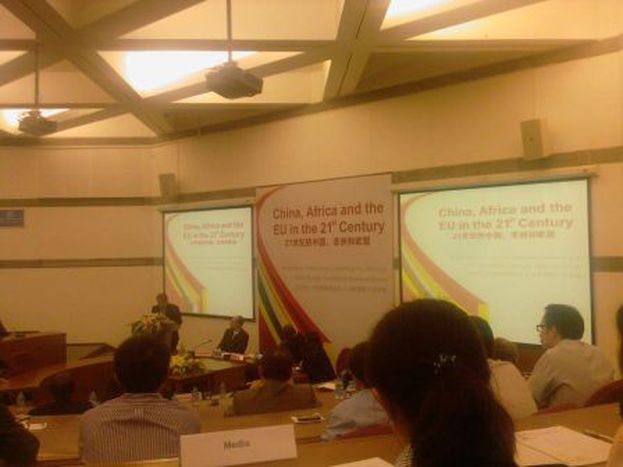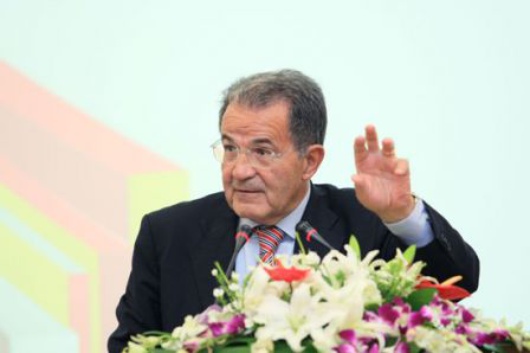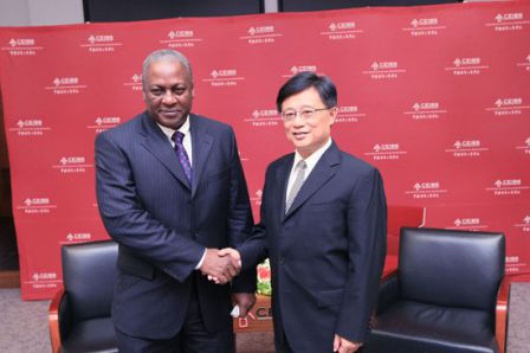
"China, Africa, and the EU in the 21st Century"
Published on
CHINA EUROPE INTERNATIONAL BUSINESS SCHOOL(CEIBS) organized a seminar on "China, Africa, and the EU in the 21st Century" on September 10, 2010 in Shanghai campus. H.E. Prof Romano Prodi is former EU Commission President and two-time Italian Prime Minister and H.E.
John Mahama is Vice President of the Republic of Ghana addressed an audience of 160 CEIBS students, alumni, guests and members of the media.

The panel was rounded out by Consul General of South Africa to China, Vika Khumalo and CEIBS Professor of Marketing & Innovation Management Kwaku Atuahene-Gima. The forum, moderated by Director of the Euro-China Centre for International and Business Relations at CEIBS David Gosset, provided a platform for frank discussions on the synergies, opportunities and challenges in Sino-African-European relationships. In his welcome address, CEIBS President Zhu Xiaoming spoke of the significant contributions that both H.E. John D Mahama and H.E. Romano Prodi have had on the Sino-Africa and Sino European relationships, respectively. H.E. Mahama, President Zhu told the audience, is a highly-regarded statesman who has played a role in promoting trade between Africa and Ghana; and he has contributed to the success of CEIBS' two-year-old EMBA Programme in Accra, Ghana.
President Zhu had similarly high praise for H.E. Prodi, whom he credited with making a significant contribution to the development of CEIBS and Shanghai. H.E. Prodi is EU Chair of Sino-European Dialogue at CEIBS. He regularly lectures CEIBS EMBA classes and alumni forums, and he was the keynote speaker at the World Investment Forum and China International Fair for Investment and Trade in Xiamen yesterday. "We are honoured to have guests from Europe and Africa here today to discuss this relevant theme," said President Zhu. In the face of challenges, he said, China, Africa and Europe complement each other and have much to learn from each other. "I look forward to hearing the insight of our guests," he said.
In a wide-ranging address that covered the similarities that China, Africa and Europe have in common, His Excellency John D Mahama told the audience that the three countries cannot afford to ignore each other. Africa's current levels of development, he said, have been shaped by its history of colonization. The challenge in going forward is to identify the method that works best for the Continent as it focuses on its main objective: improving people's lives, he explained. "The opportunity for Africa is to use (the technology, the ideas) that exist, to leap-frog to the next level; instead of trying to reinvent the wheel," he said. Citing challenges such as the need to pursue economic growth within the constraints of global concerns about climate change, H.E. Mahama said, "We must look at how we can bring our people quickly out of poverty but at same time put the least pressure on this world that God gave us... These are some of the challenges we are struggling with in Africa." Speaking specifically about Ghana, His Excellency explained that while the recent global financial crisis did not directly impact the country, there had been indirect consequences such as decreased opportunities to access credit, which led to a reduction in the county's growth rate. He stressed, however, that there are signs of economic improvement, with FDIs on the increase, for example. "This is mainly because other locations are saturated, and Africa is seen as the last frontier for investors," he explained. He also cited increased investment in the country's telecommunications industry, a benefit of earlier years of deregulation that spurred private investment.

H.E. Mahama also spoke of the need for Africa to work together, taking advantage of its combined 1billion population to leverage their strengths globally. "Each part of the world must craft its vision to fit its own needs," he urged, adding that there is no single, one-size-fits-all solution. This was made emphatically clear, he said, during what he describes as "the lost decades": when reliance on funding agencies like the IMF and World Bank meant complying with their policies -- policies which may have worked elsewhere did not necessarily help Ghana. "Luckily, those days have ended," he said. Ghana today, he told the audience, is politically and economically stable.
In his address, Consul General of South Africa to China Mr. Vika Khumalo spoke of the realignment of global power being witnessed by the 21st Century and Africa's desire to "chart its own course through mutually beneficial cooperation". He added: "China's engagement with Africa over the past few decades, and its intensity, has taken many by surprise and, in the process, ignited hope for a great future for some, and fear of looming danger for others... I hope today's discussions will offer an enlightened look at the Sino-Africa partnership." The debate, he said, would inevitably include an examination of the US' role as well, adding a fourth element to the discussions. Each element, he said, has a role to play as Africa focuses on it main objective: economic development.
CEIBS Professor of Marketing & Innovation Management, Kwaku Atuahene-Gima, also spoke of Africa's development needs, framing his comments within the context of the opportunities CEIBS provides in management education. "Management is the most important tool in development," he said, adding that CEIBS has played a significant role in China's growth by providing world class management education. Africa's success, he told the audience, depends upon: emphasis on high-quality management education, innovation, and integration with other geographic locations such as China and Europe. The China Africa Leader Foundation, the sponsor for toady's event, was an excellent conduit for this integration, he added. In his address, H.E Romano Prodi touched on issues including the effects of colonization on economic development and stability within the African Continent. Colonization may have ended, he said, but its impact is still very evident.
The day ended with a round of media interviews with participation from all four speakers.
http://www.ceibs.edu/



